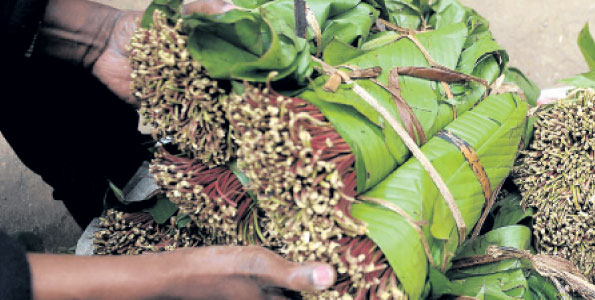 Somalia on Sept. 13 agreed to lift its recently imposed ban on imports of the mildly psychoactive leaf khat after an outcry of protest from angry cultivators in neighboring Kenya. The decision was announced at a summit of East African leaders in the Somali capital, Mogadishu—the first such gathering in 40 years in the war-torn region. While it is widely chewed in Somalia, khat (also called miraa) is grown in Kenya and Ethiopia, where large farming communities rely on exports for their livelihoods. Reversal of the ban is apparently effective immediately. Kenya's foreign minister Amina Mohamed said at the summit, "The leaders have discussed relations between the two countries and...the Miraa ban will be lifted by September 14th."
Somalia on Sept. 13 agreed to lift its recently imposed ban on imports of the mildly psychoactive leaf khat after an outcry of protest from angry cultivators in neighboring Kenya. The decision was announced at a summit of East African leaders in the Somali capital, Mogadishu—the first such gathering in 40 years in the war-torn region. While it is widely chewed in Somalia, khat (also called miraa) is grown in Kenya and Ethiopia, where large farming communities rely on exports for their livelihoods. Reversal of the ban is apparently effective immediately. Kenya's foreign minister Amina Mohamed said at the summit, "The leaders have discussed relations between the two countries and...the Miraa ban will be lifted by September 14th."
Somalia's authorities banned imports of the leaf on Sept. 5 without any explanation—although it was almost certainly appeasement of Islamist sentiment. (When jihadists were in power in Mogadishu for several months in 2006, they vigorously cracked down on khat.)
The reaction from khat growers was swift. "This is a big loss to us," Dave Muthuri, chairman of the Kenya Miraa Farmers & Traders Association, told AFP. "Farmers are crying because of the loss they are incurring. It caught everyone off-guard."
Kenyan farmers already took a hit when the United Kingdom banned khat in 2014. Britain's large East African immigrant community consumed the leaf, chewing it after meals in traditional manner. Khat, which is of course outlawed in the US, has been demonized in the Western press—portrayed as far more powerful a stimulant than it actually is, and dubiously linked to terrorism. This last canard is basically a reversal of reality, as the jihadis want to ban the stuff—along with cannabis.
Cross-post to High Times
Photo from Daily Nation







Recent comments
2 weeks 2 days ago
2 weeks 2 days ago
5 weeks 3 days ago
6 weeks 2 days ago
10 weeks 2 days ago
14 weeks 1 day ago
18 weeks 1 day ago
18 weeks 6 days ago
28 weeks 6 days ago
33 weeks 4 hours ago